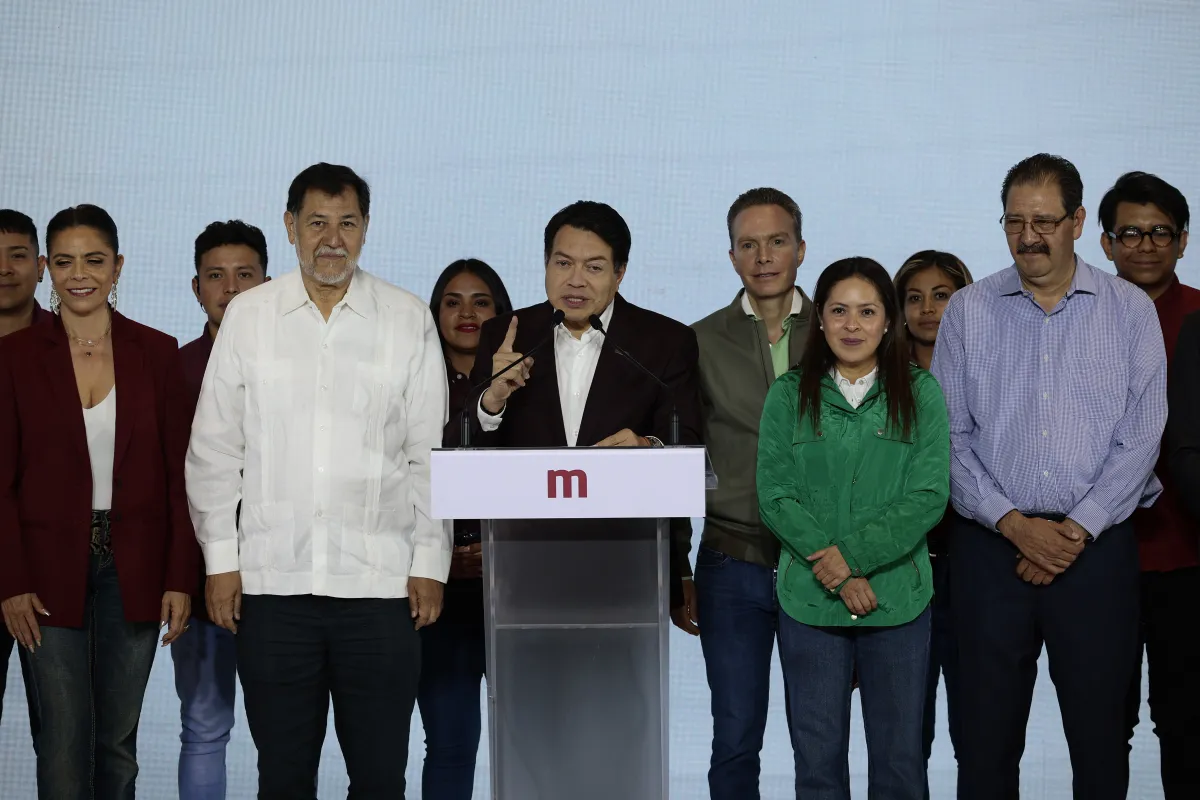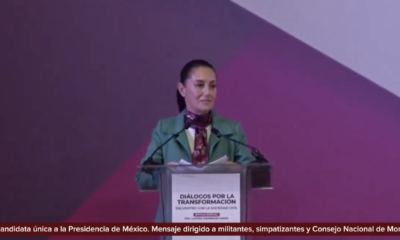International
The ruling party assures that Claudia Sheinbaum will be the first female president of Mexico

The president of the ruling party Movimiento de Regeneración Nacional (Morena), Mario Delgado, assured that his candidate, Claudia Sheinbaum, will be “the first female president” of Mexico to prevail in the presidential elections.
“We are fortunate to live in a stellar moment in the history of our country and also for our Latin America and the world. Claudia Sheinbaum will be the first female president in the history of North America,” Delgado said at the campaign headquarters in the Mexican capital.
The announcement of the ruling party comes after the closure of the voting centers at 18:00 local time (00:00 GMT), although the National Electoral Institute (INE) still does not offer official results.
According to Delgado, his exit polls give Sheinbaum a “very wide” advantage over the opposition candidate, Xóchitl Gálvez, with “two to one difference.”
“There is no doubt about Claudia Sheinbaum’s triumph,” said the leader of Morena.
Delgado described the former head of government of Mexico City (2018-2023) as “a woman who has conquered the people of Mexico” along with “a popular movement that has touched the hearts of Mexicans.”
“She is also a woman who has dedicated a large part of her life to walking with the greatest leader of our time, Andrés Manuel López Obrador,” she continued.
Morena’s national leader assured that this “represents the irrefutable triumph of women against machismo, inequality and violence” and that with his “inspiration” he will “guarantee the change to the destiny of women in the country.”
“As an indigenous woman in Chiapas (southern state of Mexico) told our candidate and future president, it represents the unfulfilled dream of her grandmothers,” he added.
On the other hand, Delgado pointed out that Sheinbaum managed to “close his mouth to a tiny opposition” which he also called “racist, classist and corrupt.”
“The people have shown that they do not let themselves be fooled, neither by hate campaigns, nor by lies. The votes beat the bots,” he said.
In turn, Delgado said that Morena will win the “full car in these elections,” that is, the main executive positions.
“Just as we set ourselves the goal, that we were going for 10 out of 10, the eight governornacies (state), the head of government (Mexico City) and you know which one else,” Delgado said at a press conference after the closure of voting centers in the majority of the country at 18:00 local time (00:00 GMT).
Although there are still no official results, Morena’s leader assured in the party’s operations center in the Mexican capital that his projections point to “a resounding triumph of Clara Brugada, who will be the next head of government” of Mexico City. The former DF had Claudia Sheinbaum, she ruled from 2018 to 2023.
In addition, he said that the polls give the triumph to his candidates in Jalisco, Claudia Delgadillo, and in Veracruz, to Rocío Nahle, which would imply governing in some of the most populated entities in the country.
He also asserted that his candidates for the state governments of Yucatan, Morelos, Puebla, Chiapas and Tabasco are shaping up winners.
Finally, in Guanajuato, one of the main bastions of the opposition, he said that there are “very closed numbers,” so they will “wait to have the minutes to defend the triumph.”
Delgado argued that he could not give more details of the presidential result “because the boxes (voting tables) are still open in some entities of the country” and they still cannot “make any reference to the federal election.”
“We are taking a full car in these elections,” he insisted.
If not governing in any state before the 2018 election, Morena now controls 21 entities, plus two other of her allies, the Green Party in San Luis Potosí and the Social Encounter Party (PES) in Morelos.
This Sunday’s main contest will define who will succeed López Obrador, who expects the triumph of the ruling party, Sheinbaum, over the opponents Xóchitl Gálvez, of the coalition of Fuerza y Corazón por México, and Jorge Álvarez Máynez, of Movimiento Ciudadano (MC).
The National Electoral Institute (INE) will publish the Preliminary Electoral Results Program (PREP) from 20:00 central hours (02:00 GMT), while between 22:00 and 23:00 local time (04:00 and 05:00 GMT) it will announce the quick count, which can define the winner of the presidency.
International
U.S. Senate Rejects Budget, Bringing Government Closer to Shutdown Amid DHS Dispute

The U.S. Senate voted on Thursday against a budget proposal in a move aimed at pressuring changes at the Department of Homeland Security (DHS), following the killing of two civilians during a deployment of immigration agents in Minneapolis.
All Senate Democrats and seven Republican lawmakers voted against the bill, which requires 60 votes to advance, pushing the country closer to a partial government shutdown that would cut funding for several agencies, including the Pentagon and the Department of Health.
The rejection came as Senate leaders and the White House continue negotiations on a separate funding package for DHS that would allow reforms to the agency. Proposed measures include banning Immigration and Customs Enforcement (ICE) agents from wearing face coverings and requiring them to use body-worn cameras during operations.
The vote took place just hours after President Donald Trump said he was “close” to reaching an agreement with Democrats and did not believe the federal government would face another shutdown, following last year’s record stoppage.
“I don’t think the Democrats want a shutdown either, so we’ll work in a bipartisan way to avoid it. Hopefully, there will be no government shutdown. We’re working on that right now,” Trump said during a Cabinet meeting at the White House.
International
Trump Says Putin Agreed to One-Week Halt in Attacks on Ukraine Amid Extreme Cold

U.S. President Donald Trump said on Thursday that he secured a commitment from Russian President Vladimir Putinto halt attacks against Ukraine for one week, citing extreme weather conditions affecting the region.
“Because of the extreme cold (…) I personally asked Putin not to attack Kyiv or other cities and towns for a week. And he agreed. He was very pleasant,” Trump said during a Cabinet meeting broadcast by the White House.
Trump acknowledged that several advisers had questioned the decision to make the call.
“A lot of people told me not to waste the call because they wouldn’t agree. And he accepted. And we’re very happy they did, because they don’t need missiles hitting their towns and cities,” the president said.
According to Trump, Ukrainian authorities reacted with surprise to the announcement but welcomed the possibility of a temporary ceasefire.
“It’s extraordinarily cold, record cold (…) They say they’ve never experienced cold like this,” he added.
Ukrainian President Volodymyr Zelensky later commented on the announcement, expressing hope that the agreement would be honored.
International
Storm Kristin Kills Five in Portugal, Leaves Nearly 500,000 Without Power

Storm Kristin, which battered Portugal with heavy rain and strong winds early Wednesday, has left at least five people dead, while nearly half a million residents remained without electricity as of Thursday, according to updated figures from authorities.
The revised death toll was confirmed to AFP by a spokesperson for the National Emergency and Civil Protection Authority (ANPEC). On Wednesday, the agency had reported four fatalities.
Meanwhile, E-Redes, the country’s electricity distribution network operator, said that around 450,000 customers were still without power, particularly in central Portugal.
Emergency services responded to approximately 1,500 incidents between midnight and 8:00 a.m. local time on Wednesday, as the storm caused widespread disruptions.
The Portuguese government described Kristin as an “extreme weather event” that inflicted significant damage across several regions of the country. At the height of the storm, as many as 850,000 households and institutions lost electricity during the early hours of Wednesday.
Several municipalities ordered the closure of schools, many of which remained shut on Thursday due to ongoing adverse conditions.
Ricardo Costa, regional deputy commander of the Leiria Fire Brigade, said residents continue to seek assistance as rainfall persists.
“Even though the rain is not extremely intense, it is causing extensive damage to homes,” he noted.
In Figueira da Foz, a coastal city in central Portugal, strong winds toppled a giant Ferris wheel, underscoring the severity of the storm.
-

 Central America4 days ago
Central America4 days agoGuatemala seizes over a ton of cocaine hidden in flour at Pacific port
-

 Central America3 days ago
Central America3 days agoGuatemala Police Arrest Prison Guard Caught in the Act of Extortion
-

 Central America3 days ago
Central America3 days agoHonduras swears in conservative president Asfura after disputed election
-

 International4 days ago
International4 days agoHistoric snowstorm paralyzes Toronto after 60 centimeters of snow
-

 Central America3 days ago
Central America3 days agoBukele leads public trust rankings as UCA survey highlights gains in security
-

 International4 days ago
International4 days agoSpain’s irregular migrant population rises to 840,000, study finds
-

 Central America2 days ago
Central America2 days agoGuatemala President Says Starlink Terminal Found Inside Prison
-

 International2 days ago
International2 days agoFootball Fan Killed in Clashes After Colombian League Match
-

 International3 days ago
International3 days agoWinter Storm Fern Leaves 30 Dead and Over One Million Without Power Across the U.S.
-

 International3 days ago
International3 days agoDoomsday clock moves to 85 seconds before midnight amid rising global risks
-

 Sin categoría3 days ago
Sin categoría3 days agoEight Killed in Series of Armed Attacks in Ecuador’s Manabí Province
-

 International3 days ago
International3 days agoSpain approves plan to regularize up to 500,000 migrants in Historic Shift
-

 International4 days ago
International4 days agoRights group says nearly 6,000 killed in Iran protest crackdown
-

 International1 day ago
International1 day agoU.S. Senate Rejects Budget, Bringing Government Closer to Shutdown Amid DHS Dispute
-

 Sin categoría3 days ago
Sin categoría3 days agoEl Salvador Launches Fourth Year of Ocean Mission to Protect Marine Ecosystems
-

 International2 days ago
International2 days agoRubio Says U.S. Could Participate in Follow-Up Russia-Ukraine Talks
-

 International2 days ago
International2 days agoMissing Spanish Sailor Rescued After 11 Days Adrift in Mediterranean
-

 International4 days ago
International4 days agoVenezuela frees at least 80 political prisoners, NGO says
-

 International4 days ago
International4 days agoEU launches new probe into X over AI-generated fake nude images
-

 Central America2 hours ago
Central America2 hours agoPanama Supreme Court Strikes Down Panama Ports Concession as Unconstitutional
-

 International1 day ago
International1 day agoStorm Kristin Kills Five in Portugal, Leaves Nearly 500,000 Without Power
-

 International1 day ago
International1 day agoTrump Says Putin Agreed to One-Week Halt in Attacks on Ukraine Amid Extreme Cold
-

 International4 days ago
International4 days agoSevere winter storm grips U.S., leaves multiple dead as extreme cold persists
-

 International1 day ago
International1 day agoMan Arrested After Vehicle Crashes Into Jewish Institution in Brooklyn
-

 International4 days ago
International4 days agoFrance debates ban on social media for children under 15
-

 Central America2 hours ago
Central America2 hours agoU.S. and Guatemala Sign Trade Deal Granting Zero Tariffs to Most Exports






























